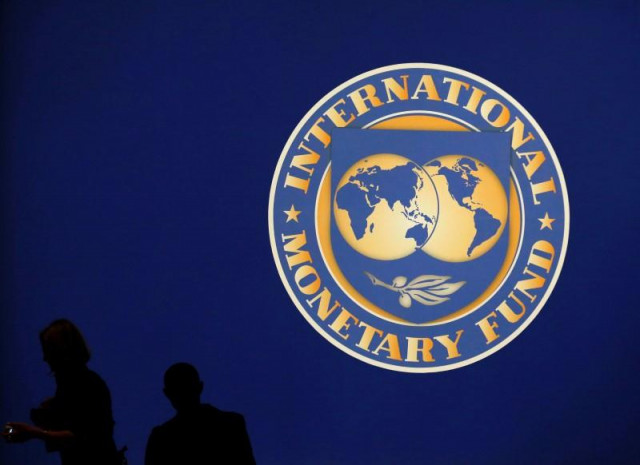IMF sends mission to Pakistan for performance review
PTI govt’s position remains comfortable on six performance criteria

PHOTO: REUTERS
The government's position remains comfortable on six performance criteria regarding fiscal and monetary targets and two continuous performance criteria set for July-September 2019 period.
But it has not done well on indicative targets related to tax revenues and reduction in circular debt and structural benchmarks about notification of powers tariffs and trace and track licensing regime for tobacco sectors.
In essence, in the first quarter, the Pakistan Tehreek-e-Insaf (PTI) government did well on stabilisation targets but did not meet goals that required reforms in the system including putting the country on the sustainable fiscal path.
“Our headquarters in Washington DC has approved the dispatching of a review mission to Pakistan for the next two weeks,” the IMF’s Resident Representative Teresa Daban Sánchez said in response to a query. She said the IMF was "monitoring the situation on a regular basis".
The IMF talks are scheduled to take place to review Pakistan's performance for July-September quarterly targets. However, the talks have coincided with Jamiat Ulema-e-Islam's (JUI-F) decision to hold rallies against the government and a possible sit-in in Islamabad. The JUI-F is demanding Prime Minister Imran Khan’s resignation.
Special Secretary of Ministry of Finance Omar Hamid also said the talks will be held from October 27 through November 7. In July this year, the Executive Board of the IMF approved 39-month Extended Fund Facility programme worth $6 billion. It already released the first tranche of $1 billion.
On successful completion of the first review talks and its subsequent approval by the Executive Board, the IMF will release the second tranche of 328 million Special Drawing Rights (SDR) or $460 million at the current value of the SDR basket.
The IMF mission will review Pakistan's performance against six performance criteria related to Net International Reserves (NIR), Net Domestic Assets (NDA), net foreign currency swap position, primary budget deficit target, net government borrowing from the central bank and stock of sovereign guarantees issued by the government.
Pakistan's position on the NIR target of negative $18.5 billion for the end of September remains comfortable as the IMF had set a very easy target. On the back of inflows from the IMF, the Asian Development Bank, and other creditors, the government is expected to achieve this target, said the sources.
In June, the NIR was negative by $17.74 billion. The NIR is calculated by excluding the short-term liabilities and payments from the gross official reserves of the SBP. The NDA target of Rs8.9 trillion is expected to be met as the government has kept the money supply under control.
According to the State Bank of Pakistan (SBP), against the target of $8.1 billion of net foreign currency swaps, it has brought its short-term exposure down to $6.8 billion.
Since June this year, the central bank has lowered its one-month swap exposure to $1.1 billion and over three months to one-year exposure has also been brought down to $3 billion, according to the central bank statistics.
The government was required to restrict the primary deficit – total expenditures minus interest payments, to Rs102 billion by the end of the first quarter.
This month, the secretary finance said that due to better performance of non-tax revenues and restrictions on the issuance of the supplementary grants, the primary balance was in surplus in the first quarter.
The government also met two other performance criteria related to fresh borrowings from the central bank and the issuance of sovereign guarantees.
The two continuous performance criteria are zero new borrowings from the central bank and zero accumulation of external public sector arrears. Pakistan has complied with both these conditions.
However, the economic managers could not meet the IMF conditions of collecting Rs1.071 trillion tax revenues by the Federal Board of Revenue (FBR), paying Rs75 billion sales tax refunds and restricting to addition in circular debt to only Rs23 billion.
The FBR missed its first-quarter tax collection target by Rs108 billion and issued only Rs30 billion tax refunds and the power division failed to restrict the addition in circular debt by only Rs23 billion.
The sources said that the government also could not meet the structural benchmark about issuing a license for the track and trace system for the tobacco sector due to delay in completing the bidding process.
It has also not notified the fiscal year 2019-20 tariff schedule as determined by the National Electric Power Regulatory Authority (Nepra).
The sources said there could be issues in explaining the IMF about the reasons behind missing the first quarter target and the prospects to achieve the second quarter (October-December) target of Rs1.295 trillion. The FBR has so far remained the weakest link in the government's economic stabilization plan.
The FBR is applying old tactics of blocking taxpayers' refunds and taking advances to inflate revenues and yet it is going to miss the second quarter target as well.
In a meeting of the National Assembly Standing Committee on Finance, PML-N MNA Ali Pervaiz said Rs962 billion first-quarter collection by the FBR was inclusive of Rs75 billion exporters' refunds. Nobody from the FBR including its chairman contested the PML-N leader’s claim.



















COMMENTS
Comments are moderated and generally will be posted if they are on-topic and not abusive.
For more information, please see our Comments FAQ